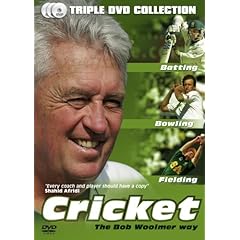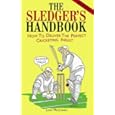 So far on the video front I've bought the three-disc DVD set of "Cricket - The Bob Woolmer Way" which is a very good basic coaching video aimed at anyone starting from scratch really. There are three discs, one on Batting which is sub-divided into straight-bat shots and more advanced strokes, one on bowling which goes through each different type of bowler, and one on wicketkeeping and fielding. There's also a few extra bits about fitness, warming up, umpiring and so on. All in all it's ideal for someone starting from a low base, and I definitely fit into that category, and I also found myself realising at last why Bob Woolmer's death a few years ago was met with so much sorrow within the world of cricket.
So far on the video front I've bought the three-disc DVD set of "Cricket - The Bob Woolmer Way" which is a very good basic coaching video aimed at anyone starting from scratch really. There are three discs, one on Batting which is sub-divided into straight-bat shots and more advanced strokes, one on bowling which goes through each different type of bowler, and one on wicketkeeping and fielding. There's also a few extra bits about fitness, warming up, umpiring and so on. All in all it's ideal for someone starting from a low base, and I definitely fit into that category, and I also found myself realising at last why Bob Woolmer's death a few years ago was met with so much sorrow within the world of cricket.  As for books, probably the one that started all this off was "You Are The Umpire", which is a set of comic-style drawings illustrating various obscure situations that could arise in a cricket match and inviting the reader to determine what the correct decision is. I was "given" it for Christmas by my parents (given in the sense that I asked them to give it to me) and it was my constant companion over the Christmas/New Year break, which is probably one of the main reasons my Girlfriend suggested I get playing this year. Well, that and having to put up with Test Match Special all day...
As for books, probably the one that started all this off was "You Are The Umpire", which is a set of comic-style drawings illustrating various obscure situations that could arise in a cricket match and inviting the reader to determine what the correct decision is. I was "given" it for Christmas by my parents (given in the sense that I asked them to give it to me) and it was my constant companion over the Christmas/New Year break, which is probably one of the main reasons my Girlfriend suggested I get playing this year. Well, that and having to put up with Test Match Special all day... A more formal version of "You Are The Umpire" would be "Tom Smith's New Cricket Umpiring and Scoring", which is accepted as being pretty much the definitive guide to all aspects of umpiring and scoring. I've bought this as I used to fill out the scorebook at school and so have half an eye on doing some scoring as a way to attain brownie points in terms of getting into the team if I need to. It contains a the full text of the laws of cricket as well as detailed guides on how umpires and scorers should go about their job, and I've already learnt a few things I never did at school (no one told me byes were depicted with triangles for example).
A more formal version of "You Are The Umpire" would be "Tom Smith's New Cricket Umpiring and Scoring", which is accepted as being pretty much the definitive guide to all aspects of umpiring and scoring. I've bought this as I used to fill out the scorebook at school and so have half an eye on doing some scoring as a way to attain brownie points in terms of getting into the team if I need to. It contains a the full text of the laws of cricket as well as detailed guides on how umpires and scorers should go about their job, and I've already learnt a few things I never did at school (no one told me byes were depicted with triangles for example).And so from a book bought in case I'm too hopeless to get a game, to a book bought in case the club at some point judges me to be considerably better than I think I am: "The Art of Captaincy" by Mike Brearley. This book goes into great depth on the subject of what qualities a captain needs to have and what roles he needs to be able to perform. Brearley also stuffs in all sorts of anecdotes and other digressions on cricket and life in general which make it a pretty good book to read even for those with no desire to captain a side or even play cricket. I'm about a third of the way through and it's a thoroughly unputdownable read which I'd recommend to almost anyone (Not my Grandma though - By her own admission cricket is something she will never be able to fathom.). It's doing my cricket knowledge a power of good.
As I've already mentioned on this blog I've got myself a copy of Peter Philpott's "The Art of Wrist Spin Bowling" which is regarded as the must-have book for any aspiring wrist-spinner. I've already read it almost cover to cover (I skipped some of the more advanced bits so my mind wouldn't be led astray while I'm still getting a grasp of the basics) and I can see why it's got such a reputation as it is exceptionally well-written. It's quite brief (I read almost all of it in a couple of days) but everything I need to know is in there. The chapter on "mind and body" is particularly good, with some excellent tips on concentration and close focusing.
By far the heaviest book I've got so far is the quite simply biblical "Art and Science of Cricket" by our old friend Bob Woolmer. It goes over all the main points of the DVD, but also goes into much greater depth and bredth on the subject of cricket, and tackles not just how to play the game but more importantly how to think about the game. I've just been reading a chapter on how to mentally approach the different roles of a cricketer which will probably in itself prove to make the book worth the reasonably high price tag. Flicking through the book there are also large tracts dedicated to the science that make the various techniques work, and as a former science buff I'm looking forward to reading all of that. Like I say it's expensive, but it's also very valuable.
 There are two other books I've bought just for fun, both with the aim of improving not my cricket but my all-round gamesmanship. Firstly "The Sledger's Handbook" covers all aspects of sledging with copious examples of great quips and retorts heard on the cricket field over the years. I have also obtained a copy of Stephen Potter's classic "The Theory and Practice of Gamesmanship (or the Art of Winning Games Without Actually Cheating)" on which the classic 1959 film School For Scoundrels was based. Understand, I haven't bought these last two with a view to turning myself into an insufferable twister on the cricket pitch, but merely to have the appropriate ammunition should I be faced with an opponent who is an insufferable twister...
There are two other books I've bought just for fun, both with the aim of improving not my cricket but my all-round gamesmanship. Firstly "The Sledger's Handbook" covers all aspects of sledging with copious examples of great quips and retorts heard on the cricket field over the years. I have also obtained a copy of Stephen Potter's classic "The Theory and Practice of Gamesmanship (or the Art of Winning Games Without Actually Cheating)" on which the classic 1959 film School For Scoundrels was based. Understand, I haven't bought these last two with a view to turning myself into an insufferable twister on the cricket pitch, but merely to have the appropriate ammunition should I be faced with an opponent who is an insufferable twister...




1 comment:
Some excellent choices there. I have all those and they will certainly keep you busy. You might be interested in the advice I put on my site at www.pitchvision.com/micricketcoach
Your story is an interesting one, can't wat to see how you go on!
David
Post a Comment